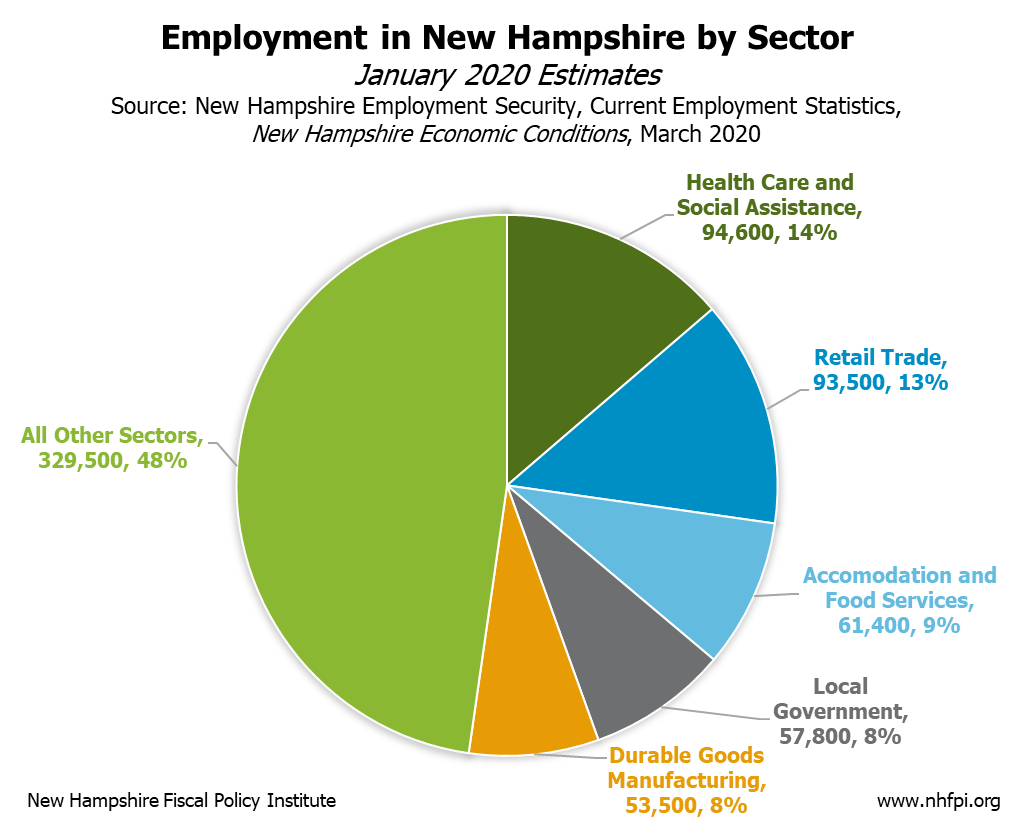Workers in New Hampshire may be disproportionately likely to be impacted by the COVID-19 crisis, as some of the state’s largest employment sectors include those most immediately affected. These impacts include both a higher risk of actual exposure to the 2019 novel coronavirus, and less income from reduced hours or eliminated positions for workers who already had some of the lowest incomes and least job stability among New Hampshire’s workforce.
In 2018, the most recent full year for which there are detailed data, there were 658,816 jobs based in New Hampshire. Survey estimates for January 2020 indicate the number had grown to approximately 690,300 nonfarm, filled jobs by that month. These latest estimates show Health Care and Social Assistance as the largest employment sector, with approximately 94,600 positions, or about 13.7 percent of the total identified in the survey. Those working in the health care industry are on the front lines of this crisis, and are among the most likely to interact with people who have been exposed to the 2019 novel coronavirus. These essential workers will face considerable risks as this crisis goes on, and may be in need of assistance themselves, such as support with child care or other family care-giving needs, during these trying times.
The next largest employment sector is Retail Trade, with an estimated 93,500 employees in January 2020. Long the state’s largest employment sector, online commerce and other trends in the economy have resulted in store-based retail positions declining in recent years. In 2018, Retail Trade positions paid on average $631 per week, while the statewide average weekly wage in New Hampshire was $1,092 per week. A separate, occupation-based survey estimated that there were approximately 22,400 cashiers and 24,750 retail salespersons in New Hampshire in May 2018, making median hourly wages of $10.64 and $11.75, respectively.
Based on published subcategories, Accommodation and Food Services was the next largest employment sector in New Hampshire, with an estimated 61,400 employees in January 2020. In 2018, the average weekly wage for jobs in this sector was $418, with those specifically in food services, the vast majority of employment in this sector, averaging $403 per week.
Both Retail Trade and Accommodation and Food Services are likely to see significant job losses and reduced hours during the COIVD-19 crisis. Governor Sununu’s emergency order closing restaurants, bars, and other food establishments to customers is a necessary and prudent step to protect public health. The impacts of both this order and voluntary abstention by customers from buying take-out or delivery meals from food establishments will likely mean job losses and restaurant closures, affecting many workers in this important New Hampshire industry. Reduced customer foot traffic at retail stores, as people try to minimize the risk of catching the 2019 novel coronavirus, will also likely reduce income and eliminate employment for people working in Retail Trade.
The relatively low levels of income for people working in these sectors suggest that those who lose income or jobs likely have very limited abilities to absorb the loss of income. High costs of living relative to the low wages typically offered in these sectors, as well as the lack of relative wage growth for workers with consistently low wages in New Hampshire since the last recession, indicate that these individuals and families likely have very little available in savings. U.S. Federal Reserve Bank survey data indicate about four in ten adults in the United States could not cover an unexpected $400 expense with cash, savings, or a credit card that they would pay off at the end of the month.
Even with Governor Sununu’s emergency order to expand eligibility for Unemployment Insurance benefits, a critical step to help partially or fully unemployed workers, the economic damage done to families already facing steep challenges to afford expenses will be very difficult to overcome. The Economic Policy Institute, using initial estimated projections of potential job losses from the COVID-19 crisis, produced state-by-state projections of job losses late last week. These state-level projections anticipated that losses may be largest in food services, accommodations, and brick-and-mortar retail operations, but that jobs would be lost throughout the economy. The projections, which are based on early, limited data, anticipated between 24,000 and 27,000 jobs in New Hampshire would be lost by the summer of 2020. Relative to the estimated number of people unemployed in New Hampshire and the size of the labor force during February 2020, such an increase may more than double the unemployment rate in the state. As this crisis may lead to a services-based recession, which is not the normal driving force behind an economic downturn, forecasting job losses is a difficult task.
The health and economic impacts of the COVID-19 crisis will be severe, and will likely impact workers in some of New Hampshire’s largest employment sectors most dramatically. Many of these Granite Staters were likely those already living with very limited incomes and resources, and will need additional supports to weather this crisis without lasting harm to their economic stability.
For updates on the COVID-19 crisis and both New Hampshire and federal policy responses, see NHFPI’s Common Cents blog.
– Phil Sletten, Policy Analyst

